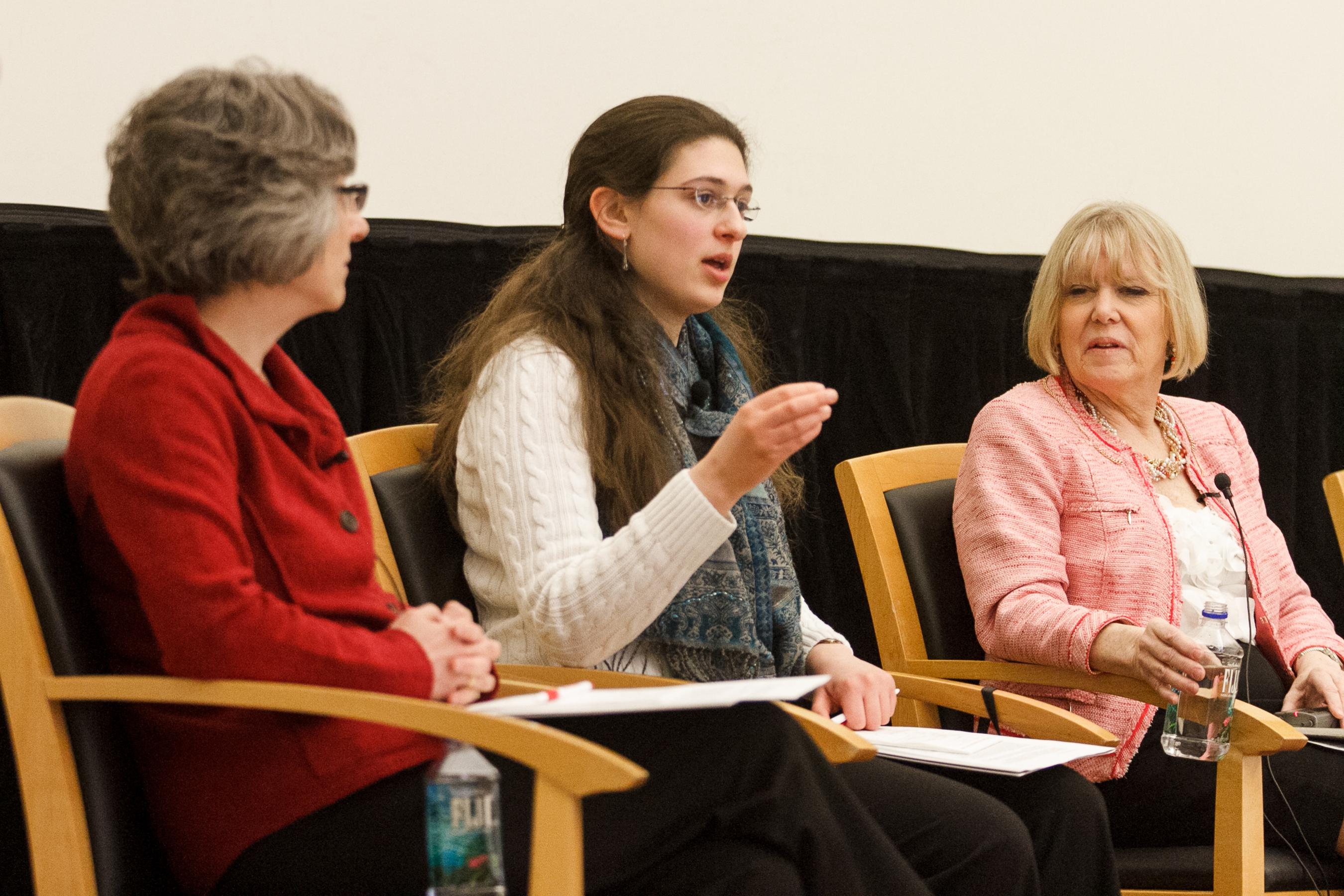Telling Herstories

From left: President Nancy A. Roseman, Shayna Solomon '16 and Sharon Davie '68 discuss the perils and rewards of being strong women leaders. "Our male counterparts have different perspectives toward women leaders, which color the way we lead," Solomon said. Photo by Carl Socolow '77
Panel discussion dissects women's progress
by Michelle Simmons
Have you been told you’re “bossy”? Or perhaps you’ve been called that other B-word? From the recently launched Ban Bossy campaign to the media frenzy surrounding Hillary Clinton’s prospects as a U.S. presidential candidate, the perennial question of women’s equality remains a vexing one.
And with the national dialogue that emerged with the 2013 blockbuster success of Facebook COO Sheryl Sandberg’s Lean In: Women, Work and the Will to Lead and the appointment of Nancy A. Roseman as Dickinson’s first woman president, Melissa Garcia, director of the Women’s & Gender Resource Center, decided the time was ripe for a campus conversation on women and leadership.
Held March 17 in honor of Women's Herstory Month, Women and Leadership at Dickinson: A Panel drew questions about power and privilege, the durability of the glass ceiling and the value of mentoring. The event, held in Allison Hall, was co-sponsored by the Women's & Gender Resource Center, the President's Commission for Women and the Department of Women's & Gender Studies.
Amy Farrell, professor of American studies and women’s & gender studies, moderated a panel of women leaders from multiple generations:
- Esprit Basner ’15, an English and women’s & gender studies double-major and student director for new student programming in the First-Year Orientation program
- Brenda Bretz ’95, associate provost for curriculum
- Sharon Davie ’68, founder of the women’s studies program at the University of Virginia and director of the university’s Women’s Center
- Nancy A. Roseman, president and professor of biology
- and Shayna Solomon ’16, a political science and Judaic studies double-major and president of Hillel.
“I’ve been thinking about the word ‘women’ and how it’s used,” said Davie in response to Farrell’s opening question about whether women’s leadership style is—or should be—different from men’s. “It’s not a monolithic word. Our styles and ways of leading are influenced by so many ways of being.” Davie went on to discuss the work she’s been doing in Kenya to document stories of women’s economic-empowerment groups. In many rural communities there, collective leadership emerges from the bottom up. While these alternative models of leadership have transformed their communities, they tend to go unacknowledged.
Those alternative models featured prominently in the discussion, as did Sandberg’s book. “We don’t lean in as much as we should,” said Bretz. “We live those cultural expectations without even knowing it. Only recently have I felt comfortable taking credit for my own ideas.”
Davie acknowledged that she had felt some bias against the book before even reading it, but she was “pleasantly surprised” by its message. “The question Sandberg asks is, ‘What are you afraid to do? What is it you want to do but are afraid to? Do that, lean in,” said Davie. “How many of us follow our passions?”
It’s one thing to decide to follow one’s passions, it’s another to have opportunities to do so. “What is the role of educational institutions in building leadership skills in women?” Farrell asked.
“So many young women come to college already leaders,” Davie responded. “What I do is offer more, newer, riskier [opportunities to lead].”
"A sponsor is critical,” added Roseman, explaining that having a sponsor who puts your name forward for promotions or leadership positions is just as important as a mentor who can help you shape and navigate your career. “That’s someone who can change the trajectory of your life.”
“I’ve felt really connected to my mentors and sponsors,” said Basner, mentioning Assistant Director of Campus Life Annie Kondas as someone who has both supported and encouraged her to step up. “She’s kept me in leadership roles.”
Learn more:
Published March 22, 2014